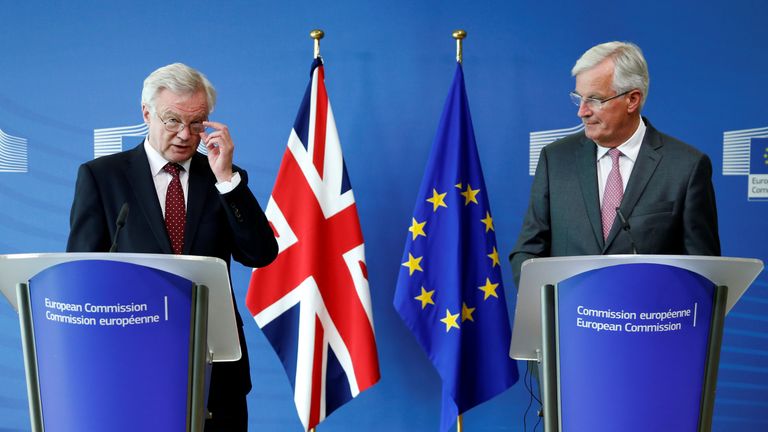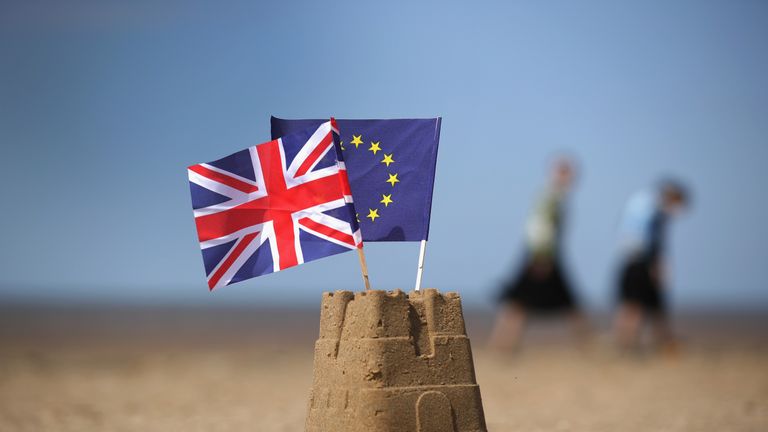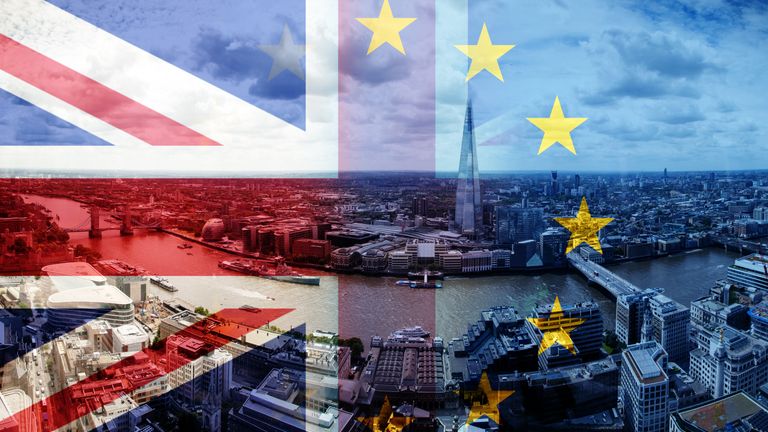EU negotiators 'incapable' of flexible Brexit talks, UK officials believe
The latest negotiations are achieving little with the British frustrated by the apparent rigid template of their counterparts.
Thursday 31 August 2017 09:16, UK
British officials have slammed their EU counterparts as being incapable of carrying out the Brexit negotiations.
In a sign the talks have reached a particularly low point, officials from the UK's Department for Exiting the European Union (DExEU) are understood to have come to the conclusion their opposite numbers on the EU side do not have a mandate to negotiate effectively.
The damning assessment by the British comes as Brexit Secretary David Davis, who is in Brussels, prepares to hold a news conference alongside his opposite number Michael Barnier to mark the end of the third round of talks.
The European Commission's team of negotiators, led by former French minister Mr Barnier, are mandated by the governments of EU member countries to carry out the negotiations on their behalf.
However, sources close to the Brexit talks have said British officials are increasingly of the view EU negotiators have not been given the freedom to negotiate, in the form of a loose framework, but are instead tied by a rigid template.
The consequence - in the view of the British side - is deadlock, with the EU side setting out their position on the various issues and then waiting for the British to move to that position.
The UK believes there is little in terms of a proper negotiating process bringing the two sides closer together.
Responding, the EU side have said they can only move once they are entirely clear on what the British position is on the numerous issues.
"To be flexible you need two points, our point and their point," Mr Barnier told reporters on Wednesday.
"We need to know their position and then I can be flexible."
And in a tweet late on Wednesday, he wrote: "European Council guidelines are designed for serious and constructive negotiations, but we need clear UK positions on all issues."
His department has given no further comment.
On Monday, before the start of the latest round of talks, Mr Barnier said it was time for "serious" negotiations.
"To be honest, I'm concerned." he said.
"We must start negotiating seriously. We need UK papers that are clear in order to have constructive negotiations."
In reference to Mr Barnier's comments, a British source familiar with the negotiations told Sky News: "The view around town is that 'serious' means agreeing with them. That is not what it means."
Reacting to suggestions the UK has entered into these negotiations unprepared, British sources have claimed that as well as detailed "position papers" on the separation issues, they have entered into each negotiating session with detailed presentations.
On the most intractable issue, the so-called divorce bill, three hours of intense discussion on Tuesday was accompanied by 23 slides and 11 pages of dense text, a source said, pointing out that the .
"Why would the UK negotiators sign off large sums on four pages?" the source said.
Broadly, it is clear this third week of negotiations has not gone well.
Officials seem to have downgraded the definition of "progress" to simply meaning that issues have been discussed and better understood by both sides.
Genuine progress on any of the key separation issues - the Northern Irish border, citizens' rights and the financial settlement - appears almost entirely absent.
One hundred British and 47 EU negotiators have been locked in five separate rooms inside the European Commission headquarters all week hammering out the three issues.
The EU has insisted "sufficient progress" must be made on all the separation issues before talks can move to the second phase - the future relationship and trade talks.
The British have repeatedly claimed phase two trade issues must be discussed now as they are inextricably linked to the separation issues.
But the EU has flatly refused to allow any future relationship discussion.
On the exit bill, the two sides appear to be approaching the issue from entirely different directions.
The EU team's "top-down" approach is, according to sources familiar with the UK view, formulaic and over-eggs the amount actually owed.
The British are insisting a "bottom-up" approach is the appropriate and legal way to reach agreement, as each area of financial contention involves unique issues.
Neither side has ever said how much they believe the UK owes the EU in financial contributions, although the EU has consistently chosen not to deny a reported demand for €60bn (£55bn).
Although Foreign Secretary , the UK Government has accepted some sort of payment will be made and that it will meet its legal obligations.
British negotiators have once again called for an intensification of the negotiating process with more negotiating rounds.
The current timetable set by the European Commission allows for four negotiating days per month.
It was hoped that "sufficient progress" on the separation issues would be achieved by a key summit of EU leaders in late October, but that is now looking unlikely.
"If it goes very slow, as is the case at the moment, it will be very difficult to say there is sufficient progress when we are in October," the European Parliament's Brexit coordinator, Guy Verhofstadt, told his fellow MEPs on Wednesday.
Article 50 stipulates the UK must leave the EU by March 2019.
And so the longer the phase one divorce issues take to agree on, the shorter the time available for the UK to try to shape its transitional arrangements and future relationship.







